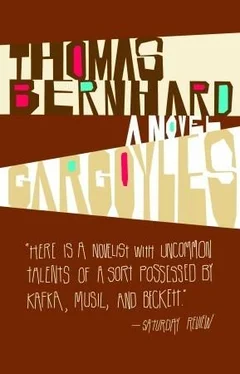Bloch asked what had brought my father to Stiwoll at this unusual morning hour. My father said he wanted to return Kant’s Prolegomena and Marx’s Dissertation , both of which he had finished. He took the two volumes out of his medical bag and put them down on the table. Then he mentioned the books he would like to borrow: Nietzsche’s lectures On the Future of Our Educational Institutions , a French edition of Pascal’s Pensées , and Diderot’s Mystification . He had to call on a woman named Ebenhöh on Piberweg, he said. Bloch did not know her.
Since he had nothing else in the house, Bloch poured us glasses of white wine, Klöscher. Early that morning, he said, he had again suffered from one of his “frightful” headaches, but it had vanished after he began working intensively on his business correspondence. He was taking more and more of the headache remedy my father had prescribed for him, he said. And he had not slept the past four or five days. My father warned him against overdoing it with the medicine, which was dangerous to the kidneys.
Recently, Bloch said, he had managed to buy a sizable property in the vicinity of Semriach. “It took me two years to put over the deal,” he said. A week earlier it had been plow-land, but he saw it as a prime building parcel that could be divided into more than a hundred lots. That way he would be able to dispose of the property quickly. “You have to be able to wait it out,” he said. This was his biggest deal of the year, he added. He asked for a better sedative; my father wrote a prescription. “Naturally I’m not liked,” Bloch said, and my father stood up. They arranged to meet the next Wednesday. For the past two years my father had been seeing Bloch every Wednesday.
We went to Frau Ebenhöh on foot.
“Bloch has the art of seeing his life as an easily understood mechanism that he can keep regulated, speed up or slow down, according to his needs,” my father said. “However he uses his powers, the result is always practically useful, which makes the whole thing bearable. He finds pleasure in this art and is always trying to teach it to his family.” Basically, my father said, Bloch was the only person he could talk with in a manner that was never awkward, and also the only person whom he wholly trusted. Bloch had become a friend who meant more than other lost friends, all those others scattered throughout the countryside pretending to be its intelligentsia, exiled in deep, sunless valleys, in small towns and dull marketplaces and villages, accepting their monotonous fate as country doctors in a way that used to pain him when he himself was still a student, but now only repelled him. For all these people, the high point had been their university years, he said. Once discharged into a world disastrously trustful of them, they fell into a horrible familial and consulting-room apathy, irrespective of whether they worked in hospitals or in private practice. He was shocked, my father said, by the total submergence of these former classmates, as he discovered whenever he wrote to one or another of them, letters he felt to be increasingly pointless. Lifelong dilettantes, they married much too soon or much too late and were destroyed by their increasing lack of ideas, lack of imagination, lack of strength, and finally by their wives. “I met Bloch just at the moment when I had no friends left, nothing but correspondents connected with me by a shared youth and the shared trustfulness of the world toward us.”
Now and then, my father said, he would see one or another of them who in the meantime had become totally absorbed in the sexual pecking-order. Such a colleague would sentimentalize about friendship. But these encounters took place nowadays only by chance, at railroad stations or conventions, and he would feel nauseated, my father said, and have to keep a tight grip on himself so as not to show his feelings. At the university and in their period of internship, they used to talk a great deal about research, about the overwhelming sickness of humanity, about discoveries, about making maximal intellectual efforts, about medical science, the pitiable condition of man and the necessity for taking an uncompromising stand. But all that was left of them were well-dressed quacks who traveled much, hurriedly said hello when they ran into each other, and talked about their family problems, about the houses they were building, and obsessively about their cars. Bloch, on the other hand, was a man who did not lose his grip in spite of the wild way history was accelerating its pace, by the hundredfold or thousandfold from year to year.
From Stiwoll, in the midst of a rooted, by now grotesque anti-Semitism, among the coarse mountaineers who despised him and did business with him, Bloch had a better view of the world than men in metropolitan centers. Stiwoll was for him a kind of “gruesome private hell in the mountains” that he had created for himself ten years ago. He had many friends here and there throughout the world, though few relations, who shook their heads over him in astonishment or disapproval. From time to time he declared that he stayed on in Stiwoll to engage in open-ended studies for the benefit of his own people.
My father said that he was looking forward to Diderot’s Mystification , that belatedly discovered essay Bloch had recommended to him. He was more and more turning to the French writers nowadays, he said, and away from the Germans. “Basically I’ve never really had much need for pure literature, and this tendency of mine seems to be growing stronger. The closer I come to clarity and logic, the less receptive I find myself to so-called belles-lettres.” He regarded writing of that kind, he said, as an annoying and on the whole ridiculous falsification of nature. Writers were always soiling nature, whether they were more or less unknowns or more or less celebrated, and whether they put current events in the foreground or background.
“You could not have noticed in the short time we were there,” my father said, “but except for the most extraordinary works Bloch has no entertainment literature in his library.” He had the impulse to visit Bloch in Stiwoll more often than once a week, he said, but recognized that he must not strain the relationship.
I was struck by the strength of the affection, otherwise rare in him, that my father showed for this real estate man Bloch. Perhaps he was carrying it too far, without Bloch’s himself being aware of this feeling on my father’s part. But I also suddenly realized how alone my father is and how meagerly he opens his heart to us, his children.
He’s almost never at home, I thought. My sister is always alone and he is always alone too.
Actually my father meets more and more people in order to be more and more alone.
But he must have sensed that I was giving thought to his almost total isolation. He hated to be an object of pity, and said: “I am exaggerating. It’s very different from what you think. Everything is always very different. Communication is impossible.”
Our path to Frau Ebenhöh’s led through an unfenced orchard whose fallen apples and pears had not been gathered, as I at once noticed. The irregularities in the orchard and garden were suspect, suggesting a person whose inner rhythms were disturbed; the quietude of the garden was of a feverish, morbid kind. All the windows of the one-story house were open. It was sultry. Behind one of those windows lies Frau Ebenhöh, I thought.
I imagined her lying awake and listening for footsteps in the garden, deciding who it was by the sound of the footsteps. The sickroom proved to be exactly as I had imagined it, only gloomier. Her linens lay about everywhere, smelling of the fatal illness to which she was submitting without resistance.
Читать дальше












